As warm weather approaches, many of us crank up our air conditioning systems to stay cool and comfortable. At Presidential Ventilation Systems Ltd., we understand that running your HVAC system smoothly is essential during hot months. Before giving us a call, there are a few things you can check yourself to ensure your system is working efficiently.
With over 2 decades of experience serving residential and commercial customers, we've seen it all. Here are some tips from our expert technicians to help you troubleshoot common HVAC issues before they become more significant problems. Remember, if you need assistance, we're always here to help. You can get in touch with us at any time for professional heat pump services or for advice.
Maintaining your HVAC system during the warm months is essential for keeping your space comfortable and your energy bills in check. These simple service tips can help you troubleshoot common issues before they escalate:
One of the most common issues that can affect your HVAC system's performance is a dirty air filter. When filters get clogged with dirt and dust, it reduces airflow, making your system work harder to maintain the desired temperature. This can result in higher energy bills and potential damage to the system over time.
Tip: Inspect your filter regularly, especially during heavy use periods like summer. If it's dirty, clean or replace it. For ducted systems, we recommend replacing the filter every 1-3 months depending on usage. By ensuring your filter is clean, you improve airflow and extend the longevity of your HVAC system. We provide high-quality filters and can help you find the right one for your system.
Checking the condensate line is essential for homes with ducted heat pump systems. Over time, the clear p-trap in the line can become clogged with debris, resulting in water leaks and potential damage to your home.
Tip: Make sure the p-trap is free of obstructions. Use the brush to clear any debris. If you're unsure about how to do this, our professionals can walk you through the process or take care of it during your next maintenance visit. Keeping your condensate line clear ensures your heat pump system runs efficiently without causing water damage.
If you have a ductless system, it's essential to ensure water drains properly from the exterior drain tubing. If you notice that no water is coming out, there could be an obstruction in the drain line or drain pan. This can cause an overflow of water, which may drip from the front or bottom of the unit.
Tip: If you suspect an obstruction, it's vital to act quickly to avoid water damage. You can try clearing the obstruction yourself, but if the issue persists, call us. We're experts in servicing ductless systems and can resolve the problem efficiently.
Sometimes, the issue with your HVAC system may be as simple as incorrect thermostat settings. Before assuming a bigger problem, check your thermostat to confirm it is correctly set for cooling or heating. If necessary, switch the mode to "off" and then back to cooling or heating. Wait for about five minutes, as some thermostats or outdoor units have a built-in delay that prevents the compressor from starting immediately.
Tip: Programmable thermostats are great for energy savings but can also be tricky to troubleshoot. If you're unsure about your settings or suspect a thermostat malfunction, our technicians are here to help. We can assist with troubleshooting or recommend an upgrade if your thermostat is outdated.
A tripped circuit breaker or a blown fuse could be the reason your HVAC system isn't working. However, it's important to approach this issue with caution. A tripped breaker usually indicates a more significant electrical problem, and resetting it without professional advice can be dangerous.
Tip: If you notice a tripped breaker, do not reset it on your own. Instead, give us a call. We'll assess the situation and determine whether it's a minor issue or if there's a more significant problem that needs to be addressed. We pride ourselves on offering expert diagnostics and solutions to keep your home safe.
Your outdoor unit requires proper airflow to operate efficiently. Obstructions like leaves, dirt, or debris can significantly restrict airflow, putting extra strain on your system. This forces your air conditioning or heating system to work harder to maintain the desired temperature, resulting in higher energy bills. Over time, restricted airflow can lead to overheating and potential damage to the unit.
Tip: Check the area around your outdoor unit and remove any debris obstructing airflow. Ensure the unit is not covered on the sides or top.
Sometimes, the problem with your HVAC system may be as simple as a blocked air supply or return grills. Furniture, rugs, or curtains can inadvertently block the grills, preventing proper airflow throughout your home.
Tip: Walk around your home and check that all supply and return vents are open and unobstructed. Keeping these areas clear helps your system maintain a consistent temperature and prevents unnecessary strain on your HVAC system.
Your HVAC system should operate relatively quietly, with only the sound of air moving through the ducts or the outdoor unit's fan running. If you find unusual sounds such as grinding, banging, or squealing, this could indicate a mechanical issue that needs attention.
Tip: Don't ignore strange sounds coming from your system. Call us immediately if you hear anything unusual. Catching a problem early can prevent a more costly repair down the line.
Many modern HVAC systems will display error codes when something goes wrong. For ductless systems, continuous blinking usually indicates an error. For ducted systems, you may see an error code on the thermostat or furnace.
Tip: If you notice an error code, refer to your system's manual to identify the problem. If you're unsure, our team can quickly diagnose and resolve the issue.
After performing these checks, if your system still isn't running smoothly, it's time to call the professionals. At Presidential Ventilation Systems Ltd., we provide comprehensive residential and commercial heat pump maintenance to keep your space comfortable year-round. Our experts are fully trained and certified, and we're members of the Better Business Bureau with an A+ rating. If you need assistance, don't hesitate to contact us today. We are here to ensure your comfort every step of the way.
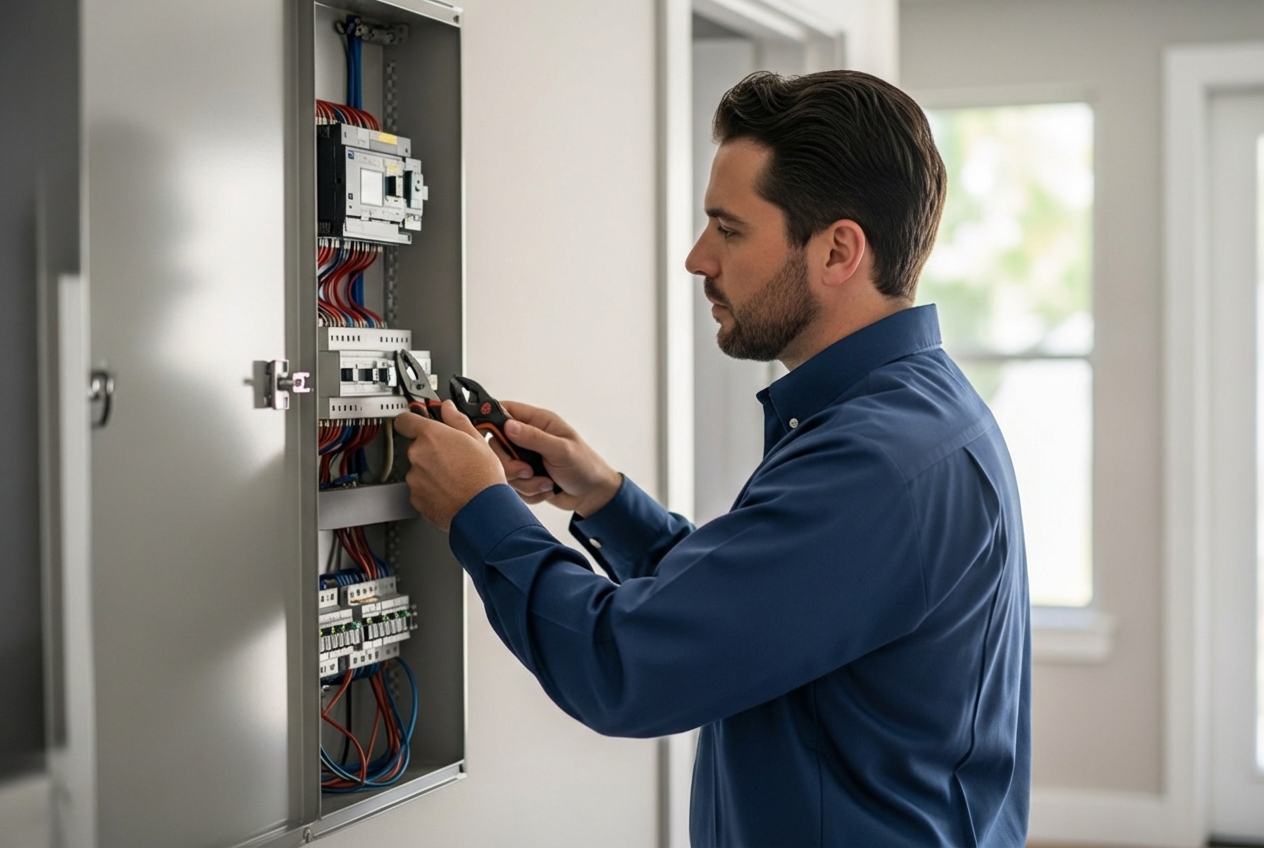

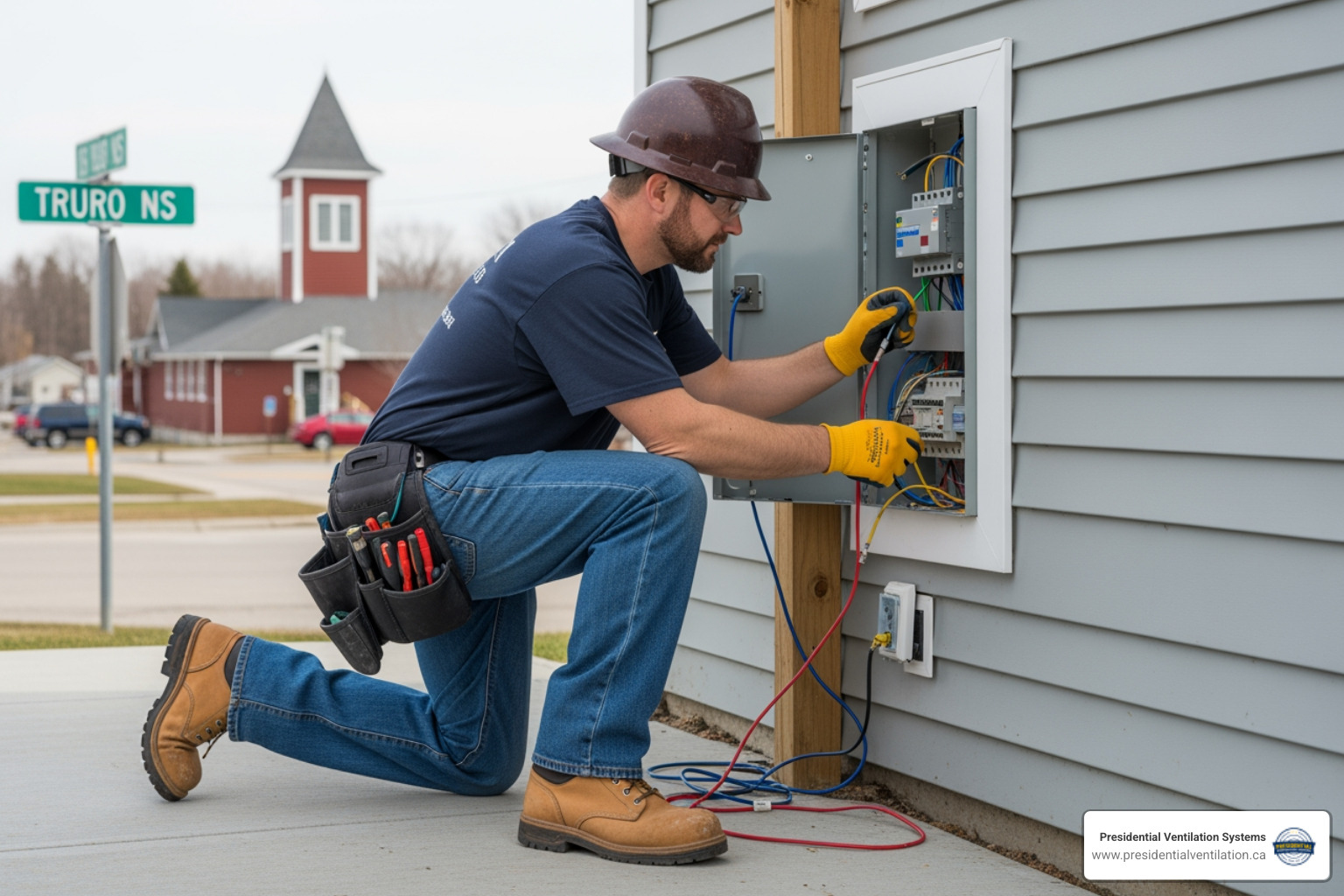
If you need a licensed electrician in truro, ns, you're making the right choice by looking for qualified professionals. Electrical work is not something to take lightly. Poor installations or repairs can lead to house fires, equipment damage, and serious safety hazards. In Truro and throughout Colchester County, homeowners and business owners rely on licensed electricians to keep their properties safe, up to code, and running smoothly. Whether you're planning a renovation, upgrading your panel, or wiring a new heat pump, working with a licensed professional protects your investment and gives you peace of mind.
For expert guidance on electrical projects, check out our Electrical Wiring Guide 2025, and when you're ready to move forward, contact us for your Electrical Services in Truro NS.
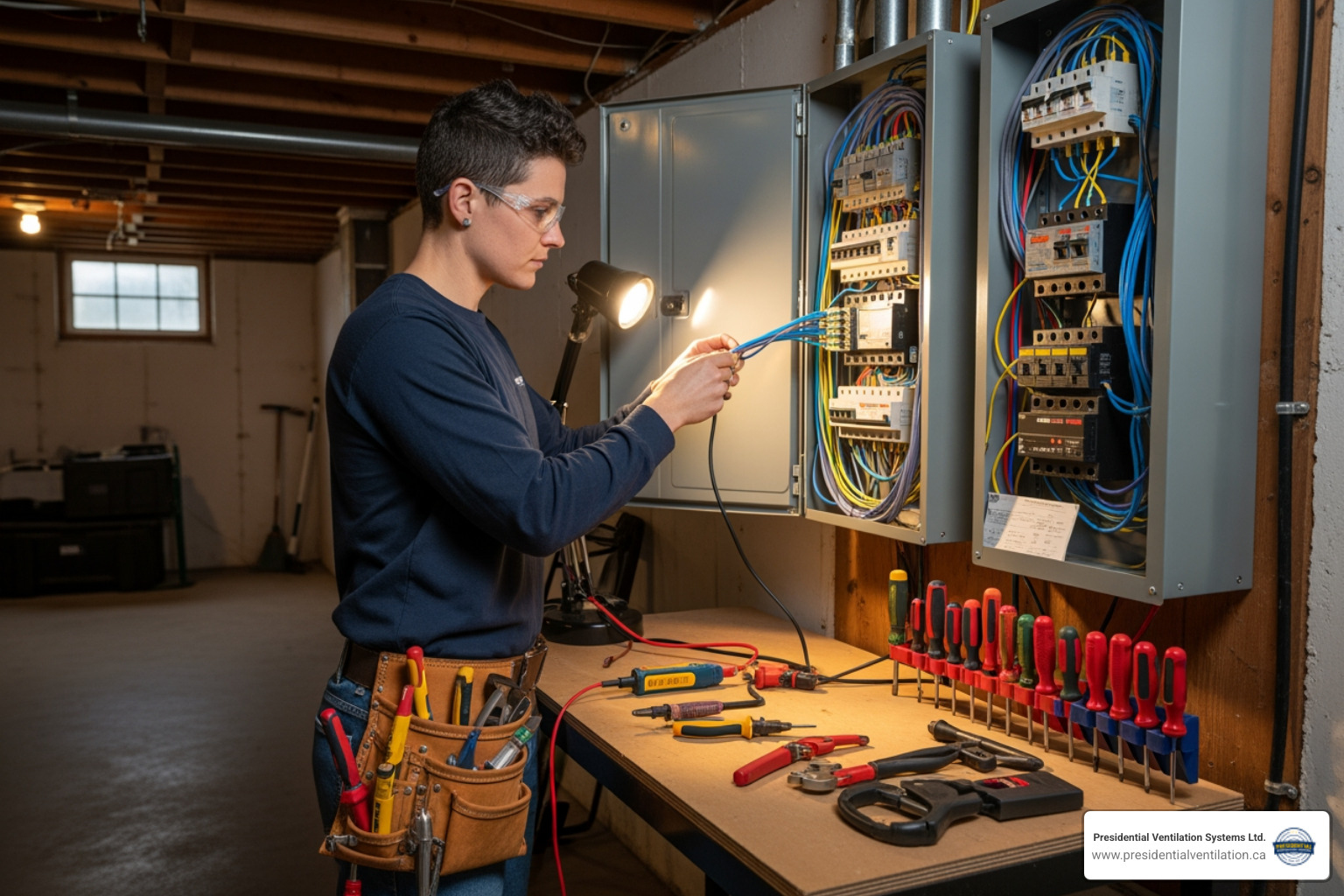
Electrical systems are the backbone of our modern lives, powering everything from our morning coffee to our evening entertainment. In Truro, like any other growing community, the demand for reliable and safe electrical services is constant. A licensed electrician in Truro, NS, is equipped to handle a vast array of jobs, ensuring your home or business operates efficiently and safely.
When we talk about electrical services, we're covering a broad spectrum. For homeowners, this often means ensuring safety and convenience, while for businesses, it's about maintaining operational efficiency and compliance. Our team at Presidential Ventilation Systems Ltd. brings over 30 years of experience, handling residential and commercial electrical needs across Truro and surrounding areas like Halifax, Dartmouth, Lower Sackville, Bedford, and Mount Uniacke.
Common residential services we see in Truro include everything from minor repairs to complete home rewiring. Businesses, on the other hand, might require specialized commercial electrical repairs, new construction wiring for a growing enterprise, or system upgrades to meet increased power demands. Whether it's a small renovation project or a large-scale new build, a qualified electrician is essential. We are adept at troubleshooting complex issues, ensuring that the root cause of any electrical problem is identified and resolved efficiently. For more in-depth knowledge, our Electrical Wiring Guide 2025 provides valuable insights into modern electrical practices.
When you call a licensed electrician in Truro, NS, you're tapping into a wealth of expertise for various crucial tasks. Here's a closer look at some of the essential services we provide to keep your property safe and functional:
Our homes and businesses are constantly evolving, integrating more technology and comfort systems. A licensed electrician in Truro, NS, is vital for ensuring these modern conveniences are powered safely and efficiently.
Finding a reliable licensed electrician in Truro, NS, is paramount for any electrical project. It's not just about getting the job done; it's about ensuring safety, compliance, and peace of mind. With so many options, knowing how to vet potential candidates is crucial.
When we look for professionals ourselves, we emphasize transparency and verifiable credentials. We recommend a similar approach for you. Start by checking their credentials, reading reviews, and asking for references. Always verify their insurance and ensure they have WCB clearance. A local electrician will also have invaluable knowledge of regional building styles and common electrical issues specific to Truro.
The "licensed" part of "licensed electrician" isn't just a formality; it's a guarantee of competence and adherence to safety standards. Here's what you should look for:
Here are some essential questions to ask a potential electrician:
When undertaking significant electrical work, obtaining the necessary permits and undergoing inspections isn't just bureaucracy; it's a critical step in safeguarding your home and investment.
Just like any other system in your home, your electrical infrastructure can age and become inadequate for modern demands. Upgrading your home's electrical system with a licensed electrician in Truro, NS, offers a multitude of benefits, enhancing safety, efficiency, and overall property value.
With over 30 years of experience, we've seen how electrical upgrades transform homes, making them safer and more capable. These upgrades are not just about fixing problems; they're about investing in the future of your property.
Your electrical panel is the heart of your home's electrical system. If it's struggling to keep up, it's a clear sign that a panel upgrade is necessary. Here are common indicators that it's time to call a licensed electrician in Truro, NS, for an assessment:
Beyond mere functionality, a licensed electrician in Truro, NS, can help you make your home more energy-efficient, saving you money and reducing your environmental footprint.
We understand you likely have questions when considering electrical work. Here are some common inquiries we address for our clients in Truro and surrounding communities.
A qualified electrician in Nova Scotia must hold a Certificate of Qualification issued by the province. This credential confirms they have met the necessary education, apprenticeship, and examination requirements. Many highly skilled electricians also possess a Red Seal Endorsement, which is a national standard recognizing their proficiency and allowing them to work across Canada. Beyond these certifications, a reputable licensed electrician in Truro, NS, must demonstrate a thorough understanding and strict adherence to the Canadian Electrical Code (CEC), as well as any specific provincial regulations or amendments that apply in Nova Scotia. They should also carry adequate liability insurance and have WCB clearance, protecting both themselves and you, the homeowner or business owner.
Hiring a local licensed electrician in Truro, NS, offers several distinct advantages. Firstly, local electricians often have an intimate understanding of the region's older building stock, common electrical issues specific to the area, and local permit requirements. This local knowledge can be invaluable for efficient troubleshooting and ensuring compliance. Secondly, local professionals typically offer faster response times, which can be crucial for any electrical issue. Finally, local electricians are deeply invested in maintaining a good reputation within their community. Their business thrives on local referrals and positive feedback, encouraging them to deliver exceptional service and build lasting relationships with clients. For us, being part of the community means we care about the quality of every job we do, from Halifax to Truro, and everywhere in between.
Preparing for an electrician's visit can make the process smoother and more efficient for everyone. To ensure a productive visit, we recommend the following steps:
When it comes to electrical work, safety should always be your top priority. Choosing a licensed electrician in Truro, NS, is not merely a recommendation; it's a necessity for protecting your property, your family, and your investment. By doing your due diligence—verifying licenses, checking insurance, and seeking local expertise—you ensure that your electrical projects are handled by qualified professionals who adhere to the highest standards of safety and quality.
A properly functioning and up-to-date electrical system provides long-term value, comfort, and peace of mind. For reliable and professional electrical work across Truro and our other service areas, the experienced team at Presidential Ventilation Systems Ltd. has the expertise to handle your electrical needs. With over 30 years in the industry, we pride ourselves on exceptional service and ensuring your electrical systems are safe, efficient, and up to code.
Contact us for your Electrical Services in Truro NS today to discuss your project and experience the difference of working with a trusted, licensed professional.
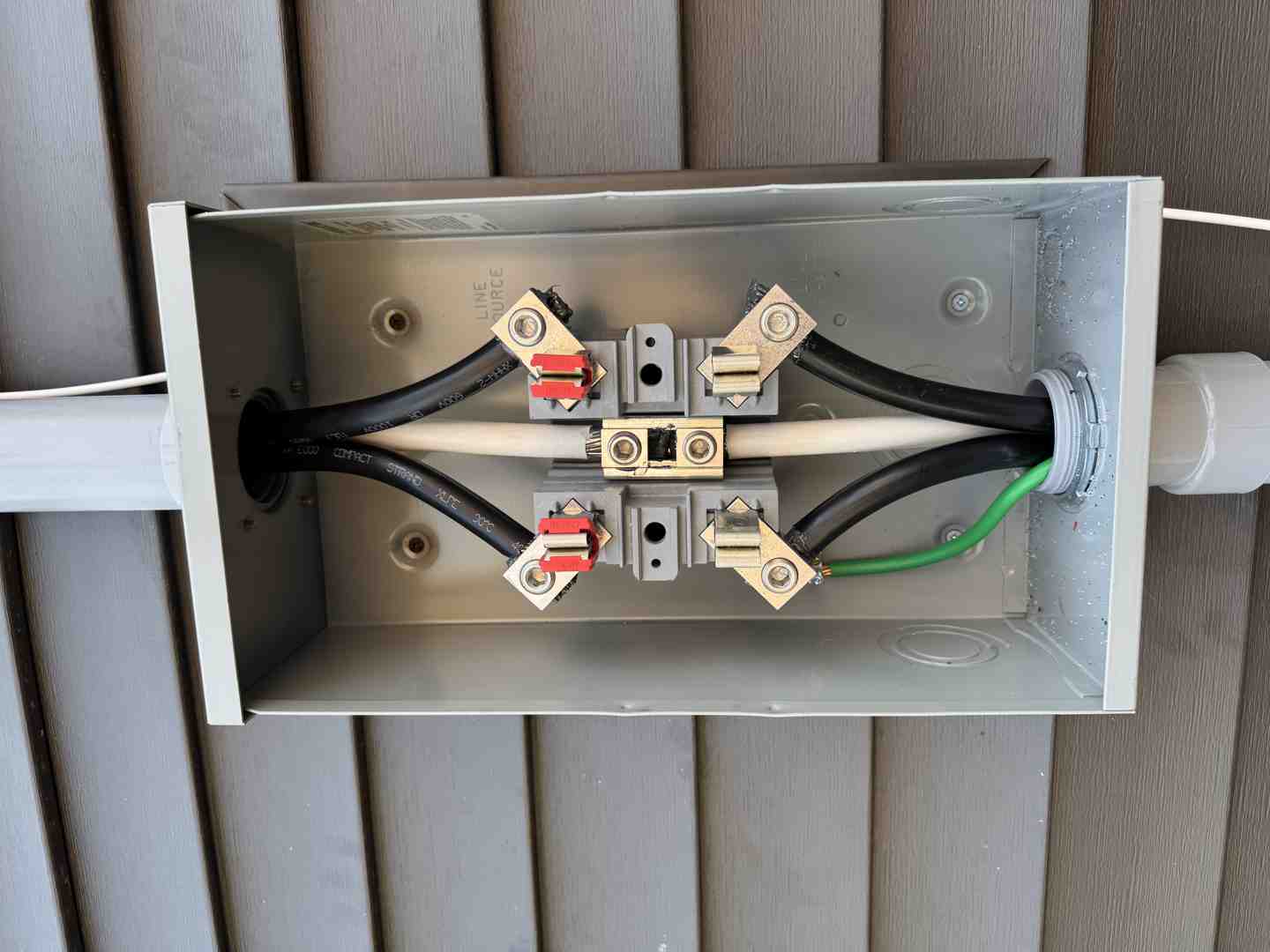


I need an electrical service upgrade for my home in Timberlea. Who are the best local electricians for the job? - this is one of the most common questions Timberlea homeowners ask, and for good reason. Older homes in the area often run on outdated 100-amp service panels that simply can't keep up with today's power demands. Whether you're adding new appliances, finishing a basement, or planning a renovation, getting the right licensed electrician makes all the difference for your home's safety and reliability.
Here is a quick overview of what to look for when choosing the best local electrician for an electrical service upgrade in Timberlea:
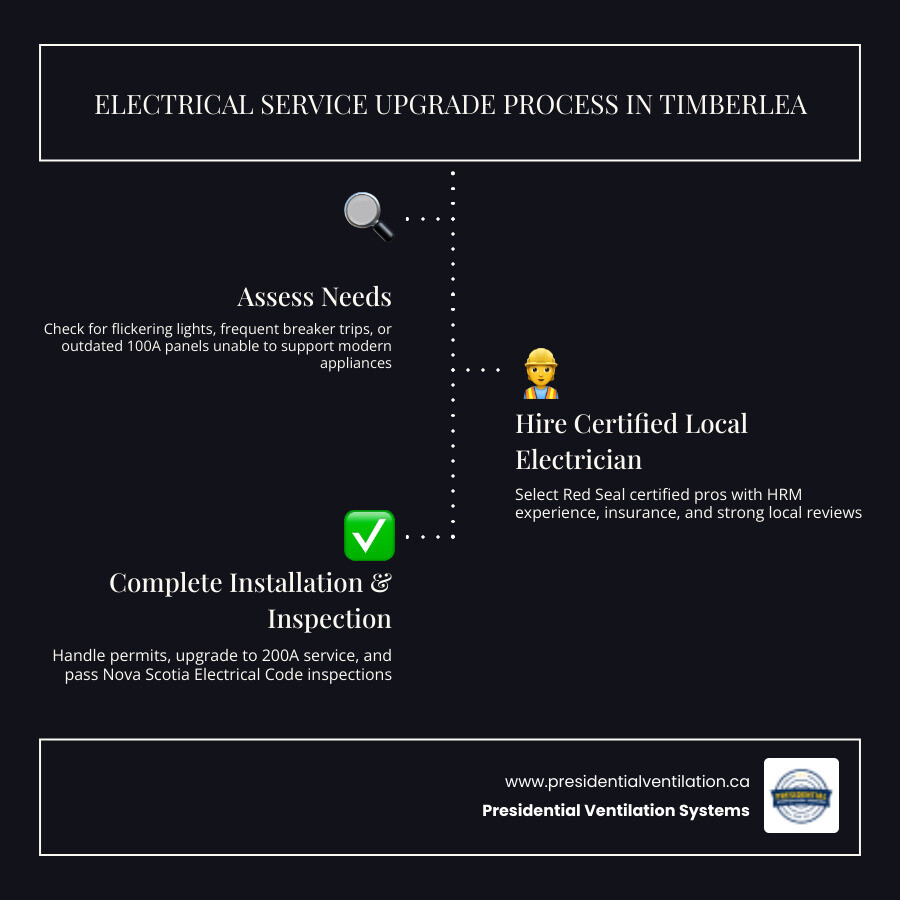
When you find yourself asking, "I need an electrical service upgrade for my home in Timberlea. Who are the best local electricians for the job?", you are looking for more than just someone who can turn a screwdriver. You are looking for a partner who understands the specific infrastructure of the Halifax Regional Municipality (HRM). Timberlea is a unique community with a mix of established older homes and rapidly growing newer subdivisions. This means the electrical needs can vary wildly from one street to the next.
At Presidential Ventilation Systems, we pride ourselves on being that local expert. With over 30 years of experience serving the HRM, we understand the nuances of Electrical Services Timberlea NS. The "best" electrician isn't just the one with the loudest advertisement; it’s the professional who shows up on time, understands the Nova Scotia Electrical Code inside and out, and treats your home with the respect it deserves.
Our team consists of certified professionals who have spent decades navigating the permit processes of the HRM and working closely with local utilities. When we step into a Timberlea home, we aren't just looking at a panel; we are looking at the heart of your home’s safety system. We ensure that every wire, breaker, and connection is optimized for modern living.
Why is everyone in Timberlea suddenly talking about 200-amp service? It’s not just a trend; it’s a necessity born from the way we live now. Many homes in Timberlea were built during an era when a "heavy load" meant running a toaster and a vacuum at the same time. Today, our homes are power-hungry hubs of technology.
The most common reason for an upgrade is moving from 100A to 200A service. A 100-amp panel is often sufficient for a small home with basic appliances, but as soon as you add modern luxuries, that capacity disappears. An Electrical Panel Upgrade provides the "headroom" your home needs to function without constantly tripping breakers or flickering lights.
Here are a few specific reasons why Timberlea residents are reaching out for upgrades:
If you are planning a residential renovation, the question of "I need an electrical service upgrade for my home in Timberlea. Who are the best local electricians for the job?" becomes even more urgent. Whether you are finishing a basement in Beechville or adding an extension in Timberlea, your existing wiring might not be up to the task.
We often see homeowners in nearby areas like Bedford and Halifax facing similar challenges. Modern renovations usually involve adding significant numbers of "pot lights," heated flooring, or high-end HVAC systems. These additions require a robust electrical backbone. By securing Electrical Services Halifax NS or Electrical Services Bedford NS through a trusted local provider, you ensure that your renovation is built on a foundation of safety.
So, how do you actually separate the pros from the amateurs? In Nova Scotia, the gold standard is the Red Seal certification. A Red Seal electrician has undergone rigorous training and passed a national exam that proves they are a master of their craft. When you hire someone, always ask if they are certified by the Nova Scotia Apprenticeship Agency.
You can also use tools like the Find a Contractor tool provided by the local utility to find vetted professionals. However, a tool is only the first step. You should also look for:
When searching for the best, don't ignore vetted professional networks. Many homeowners find peace of mind by choosing contractors who are part of established manufacturer programs or local directories that require high customer satisfaction ratings.
Experience in the local area is irreplaceable. An electrician who has performed dozens of upgrades in Dartmouth will be familiar with the specific utility hookup requirements in that area, just as we are familiar with the specific needs of Timberlea. If you need Electrical Services Dartmouth NS, you want a team that knows the local inspectors by name and understands the fastest way to get your power back on after the utility disconnect.
In Nova Scotia, electrical work isn't a "handyman" job. It is strictly regulated by the Nova Scotia Electrical Code. This code is designed to keep your family safe from fire and shock hazards.
When we perform a service upgrade in Timberlea, the process follows a strict legal path:
We also highly recommend including surge suppression as part of any panel upgrade. With the increase in sensitive electronics in our homes, a whole-home surge protector installed directly into your new panel can protect your appliances from damage during a lightning storm or power surge. Whether you are looking for Electrical Services Canada or more localized Electrical Services Lower Sackville NS, always insist on a permit and a final inspection.
To help you decide if an upgrade is right for you, we've put together a comparison of the two most common service levels found in Timberlea homes.
| Feature | 100 Amp Service | 200 Amp Service |
|---|---|---|
| Capacity | Basic household needs | High-demand modern homes |
| EV Charging | Limited / Difficult | Ideal for Level 2 chargers |
| Future Proofing | Low | High |
| Appliance Load | Standard appliances only | Multiple high-draw appliances |
| Home Value | Standard | Increased resale appeal |
One of the biggest concerns homeowners have is how long they will be without power. Typically, the actual installation takes about 4 to 8 hours. During this window, your power will be completely turned off. We coordinate with the utility to ensure they arrive shortly after we finish to reconnect the service. The final inspection usually happens within a day or two of the installation, though your power will be back on long before the inspector arrives.
If you notice your lights flickering when the refrigerator kicks on, or if you find yourself constantly walking to the basement to flip a tripped breaker, your panel is telling you it's overwhelmed. Other warning signs include:
Yes, absolutely. In Nova Scotia, it is illegal to perform a service or panel upgrade without a permit. More importantly, if you have an electrical fire and the insurance company discovers that the work was done without a permit or inspection, they may deny your claim. The "best" electricians will always include the permit process in their service—never trust a contractor who asks you to pull the permit or suggests doing the job "off the books."
Choosing the right partner for your home’s electrical system is a decision that impacts your safety, comfort, and property value for years to come. When you find yourself thinking, "I need an electrical service upgrade for my home in Timberlea. Who are the best local electricians for the job?", Presidential Ventilation Systems has been the trusted choice in the HRM for over 30 years.
We bring a combination of deep local knowledge, Red Seal expertise, and a commitment to doing the job right the first time. From handling the paperwork to ensuring your home is cleaner than when we arrived, we make the upgrade process seamless. If you're ready to power up your home for the future, contact us today to learn more about our Electrical Services Timberlea NS. Let us help you keep your home safe, efficient, and ready for whatever modern technology comes next!